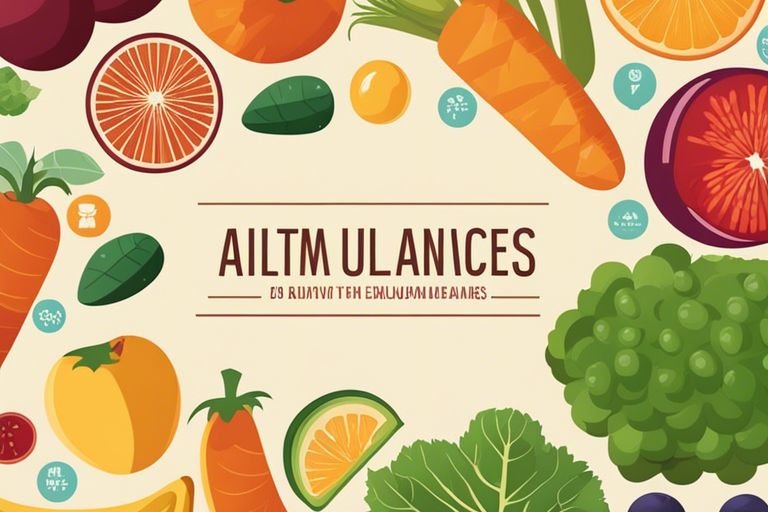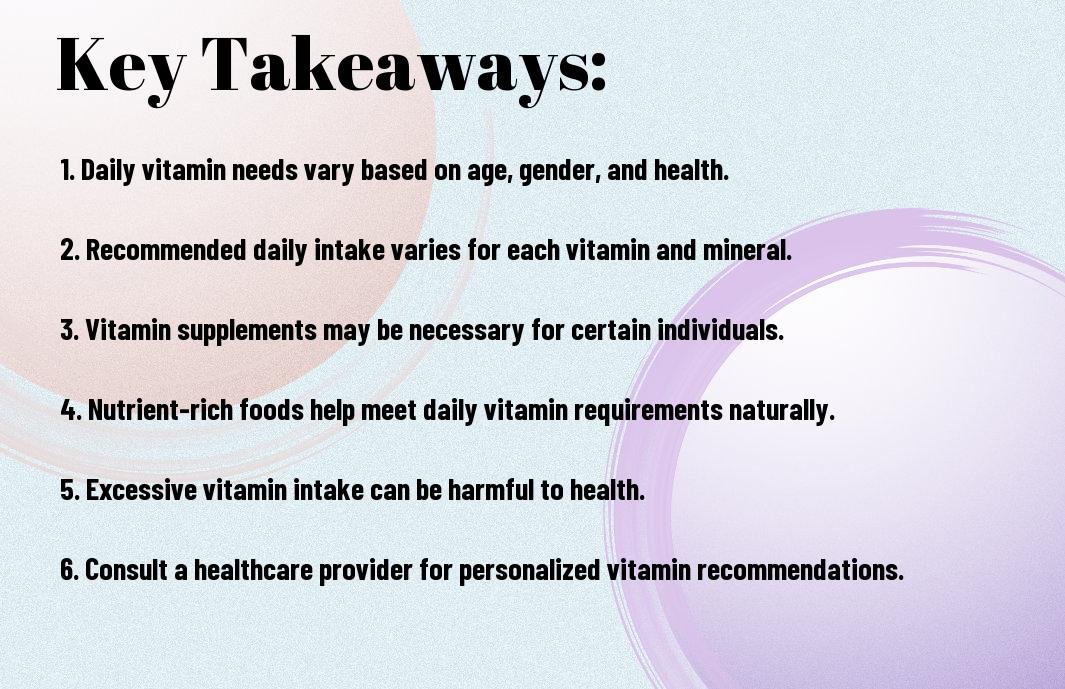
With so much information out there about vitamins and their importance for our health, it can be overwhelming to figure out exactly how much of each vitamin we need on a daily basis. In this informative blog post, we will break down the daily vitamin allowance you need to maintain optimal health and well-being. Understanding the recommended vitamin intake can help you make informed choices about your diet and supplementation to ensure you are meeting your body’s needs.
Key Takeaways:
- Recommended Daily Amounts: The daily vitamin allowance you need varies depending on the specific vitamin. It is important to consume a balanced diet to ensure you are meeting these requirements.
- Consult a Healthcare Professional: It is advisable to consult with a healthcare professional to determine the appropriate daily vitamin intake for your individual needs, as factors such as age, gender, and health conditions can impact these recommendations.
- Supplementation May Be Necessary: In some cases, it may be necessary to supplement your diet with vitamins to ensure you are meeting your daily requirements, especially if you have dietary restrictions or limitations.

Vitamin Essentials
What are Vitamins?
Your body requires necessary nutrients known as vitamins to function properly. Vitamins are organic compounds that are necessary in small amounts to sustain life. There are 13 necessary vitamins that play various roles in maintaining your health, including supporting growth, boosting immunity, and aiding in metabolism.
Importance of Vitamins in Our Diet
An necessary part of a healthy diet, vitamins are crucial for your overall well-being. They help regulate processes such as cell function, energy production, and nutrient absorption. Without an adequate intake of vitamins, you may be at risk of developing deficiencies that can lead to health problems such as weakened immunity, fatigue, and poor bone health.
Essentials such as Vitamin C, found in citrus fruits, and Vitamin D, synthesized by your skin through sun exposure, are vital for maintaining a strong immune system and healthy bones. Ensuring you get a balanced variety of vitamins through a diverse diet rich in fruits, vegetables, whole grains, and lean proteins is key to supporting your body’s daily functions and long-term health.
Vitamin Categories
Fat-Soluble Vitamins
Little do most people know that there are two main categories of vitamins: fat-soluble and water-soluble. Fat-soluble vitamins, including vitamins A, D, E, and K, are stored in the body’s fatty tissue. These vitamins are best absorbed when consumed with dietary fat because they dissolve in fat before entering the bloodstream.
Water-Soluble Vitamins
An necessary group of nutrients that the body needs in small amounts, water-soluble vitamins must be consumed regularly as the body does not store them. This category includes vitamin C and the B vitamins (such as B6, B12, niacin, riboflavin, and folate, among others).
To ensure you are getting enough water-soluble vitamins, it’s important to eat a balanced diet rich in fruits, vegetables, whole grains, and lean proteins. These vitamins play crucial roles in energy metabolism, immune function, and overall health and well-being.
Fat-Soluble Vitamins
Recommended Daily Intake
Vitamin A: How Much Do You Need?
On a daily basis, adults require about 900 micrograms of Vitamin A. This crucial nutrient plays a crucial role in maintaining healthy vision, immune function, and skin health. Sources of Vitamin A include liver, fish oils, and fortified dairy products.
Vitamin D: The Sunshine Vitamin
Any discussion about Vitamin D must highlight its unique source – sunlight. The recommended daily intake for Vitamin D is 600-800 IU (International Units) for adults. This sunshine vitamin is vital for bone health, immune function, and overall well-being.
Vitamin D is a fat-soluble vitamin that can be synthesized in the skin through exposure to sunlight. However, factors such as geographic location, time of year, skin pigmentation, and the use of sunscreen can affect the body’s ability to produce an adequate amount of Vitamin D.
Vitamin E: Antioxidant Powerhouse
An crucial antioxidant, Vitamin E plays a crucial role in protecting cells from damage caused by free radicals. The recommended daily intake for adults is 15 milligrams. Good dietary sources of Vitamin E include nuts, seeds, and vegetable oils.
An adequate intake of Vitamin E is crucial for maintaining healthy skin, cardiovascular health, and overall well-being. Including foods rich in Vitamin E in your diet can help ensure you meet your daily requirements of this vital nutrient.
Vitamin K: Blood Clotting and Bone Health
Antioxidant Vitamin K is crucial for proper blood clotting and bone health. The recommended daily intake for adults is 90-120 micrograms. Good sources of Vitamin K include leafy green vegetables, broccoli, and soybeans.
With its crucial role in blood clotting and bone metabolism, Vitamin K is a vital nutrient that should not be overlooked in your daily diet. Including a variety of Vitamin K-rich foods can help you meet your daily requirements and support your overall health.
Vitamin Deficiencies
Signs and Symptoms of Vitamin Deficiencies
All living organisms require vital vitamins to function optimally. When the body lacks a specific vitamin, it can lead to various signs and symptoms of deficiency. Common signs include fatigue, weakness, hair loss, skin issues, muscle cramps, and digestive problems. If left untreated, vitamin deficiencies can result in serious health complications.
Consequences of Prolonged Deficiencies
To prevent vitamin deficiencies, it is crucial to maintain a balanced diet rich in nutrients. Prolonged deficiencies can have severe consequences on overall health. For instance, a lack of vitamin C can lead to scurvy, while vitamin D deficiency can cause bone disorders like osteoporosis. It is vital to consult a healthcare provider if you suspect you have a vitamin deficiency to prevent long-term health issues.
It is important to be mindful of your daily vitamin intake to ensure you meet the recommended allowances. A well-rounded diet with fruits, vegetables, whole grains, and lean proteins can help you obtain all the vital vitamins your body needs to function properly.
Food Sources
Once again, getting your daily dose of necessary vitamins can largely be achieved through a balanced diet that includes a variety of nutrient-dense foods. Fruits, vegetables, meat, dairy, grains, and fortified foods are all necessary sources of vitamins that can help you meet your daily requirements.
Vitamin-Rich Foods: Fruits and Vegetables
The colorful array of fruits and vegetables available in the produce section of your grocery store offers a wide range of vitamins to support your overall health. From vitamin C-rich citrus fruits to vitamin A-packed carrots and sweet potatoes, incorporating a variety of fruits and vegetables into your meals can help ensure you’re meeting your daily vitamin needs.
Vitamin-Rich Foods: Meat, Dairy, and Grains
The protein-rich foods in this category, such as lean meats, poultry, fish, dairy products, and whole grains, provide necessary vitamins like B vitamins (including B12), vitamin D, and minerals like calcium and iron. These foods are necessary for overall health and can help fill any nutrient gaps in your diet.
Another important source of vitamins comes from fortified foods, where necessary vitamins and minerals are added during processing to boost their nutritional content.
Fortified Foods: Boosting Vitamin Content
Foods like fortified cereals, plant-based milk alternatives, and some types of bread and pasta can be good sources of additional vitamins such as vitamin D, calcium, and B vitamins. These fortified foods can be particularly beneficial for individuals who may have trouble meeting their vitamin requirements through their diet alone.
Sources
By including a variety of these food sources in your daily meals, you can ensure that you’re getting the necessary vitamins to support your overall health and well-being.
Special Considerations
Despite the general guidelines for daily vitamin allowances, there are certain special considerations to keep in mind when determining your specific needs. These considerations include factors such as age, dietary preferences, and interactions with medications.
Vitamin Needs Across the Lifespan
Special attention should be paid to vitamin needs across different stages of life. Children, pregnant women, older adults, and individuals with specific health conditions may have varying requirements for certain vitamins. It’s vital to consult with a healthcare provider to ensure you are meeting your vitamin needs adequately.
Vitamin Requirements for Vegetarians and Vegans
An important consideration for vegetarians and vegans is ensuring adequate intake of vitamins that are commonly found in animal products, such as vitamin B12 and vitamin D. While these vitamins can be obtained through supplements and fortified foods, individuals following plant-based diets should pay close attention to their intake to prevent deficiencies.
The decision to eliminate animal products from your diet can have significant implications for your vitamin intake, so it’s crucial to plan your meals carefully to meet your nutritional needs.
Vitamin Interactions with Medications
Vitamins can interact with certain medications, either reducing their effectiveness or causing adverse effects. It’s vital to inform your healthcare provider about any supplements you are taking to avoid potential interactions. For example, vitamin K can interfere with blood-thinning medications, while vitamin C can enhance the absorption of iron supplements.
Understanding the potential interactions between vitamins and medications can help you make informed decisions about your dietary supplements and ensure optimal health outcomes.
Summing up
To wrap up, understanding the daily vitamin allowance you need is crucial for maintaining optimal health and wellness. By being aware of the recommended intake for each necessary vitamin, you can make informed choices about your diet and potentially prevent deficiencies that may lead to health problems in the future. Remember to consult with a healthcare professional or a registered dietitian to determine the specific vitamin requirements that suit your individual needs.
FAQ
Q: What is the importance of daily vitamin allowance?
A: Daily vitamin allowance is imperative for maintaining good health and overall well-being. Vitamins play a crucial role in various bodily functions, including metabolism, immune function, and cell repair.
Q: How much of each vitamin do you need daily?
A: The daily vitamin allowance varies depending on the type of vitamin. For example, the recommended daily allowance (RDA) for Vitamin C is 90mg for men and 75mg for women, while the RDA for Vitamin D is 600 IU for adults up to age 70.
Q: What are the consequences of not meeting the daily vitamin allowance?
A: Failing to meet the daily vitamin allowance can lead to various health issues and deficiencies. For instance, a lack of Vitamin D can result in weakened bones and increased risk of osteoporosis, while insufficient Vitamin C intake can lead to scurvy and compromised immune function.
